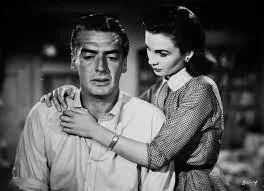Ug. This film. Well, spoilers ahead.
Bill (Victor Mature) is a married playwright who allows temptation to constantly get in the way of his personal life. His wife Carolyn (Jean Simmons) is about to miss the opening run of his latest play when he wants her opinion and this moment of his own neediness causes him to seek comfort in an intimate dinner with his lead actress. The actress spreads rumors that Bill and Carolyn are about to divorce. The rest of the movie are a series of flashbacks about their life together and the reason why Carolyn doesn’t want to come to the play.
The flashbacks show many of the ups and downs of attempting to be a professional writer. Bill doesn’t want to return to working for newspapers as found he didn’t have the energy for the day job and the dream job. A friend of theirs, another newspaper man, agrees with him, confessing that he’s been trying to write a novel in his spare time for ten years. Because of this, Carolyn supported her and Bill with her modeling career at the start of their marriage, something Bill screws up with gambling habit. She also acts a little as his manager, cautioning him on reading contracts and getting paid what he’s worth, especially after his first play flops. And like all women in these films, she’s his cheerleader, helping him to create a schedule to keep him in the routine of writing and not giving up. I will give Bill some credit. Since he works from home, he pitches in with the housework. Way to stick it to 1950s stereotypes!
When Carolyn is pregnant, the couple have seen some success with Bill selling the rights of one of his plays to a Hollywood Studio. However, his gambling eats away at the money and he takes a job as a waiter in a swanky restaurant where he can slip copies of his plays into producers’ pockets. Interestingly, this strategy works and he has his first hit. Tragedy strikes the same night when they lose the baby and Carolyn struggles with depression for the next two years when they discover they’ll never have a child. Instead, they adopt a boy Carolyn used to babysit when his mother passes. Carolyn is still Bill’s biggest fan and goes to all of his openings until she has difficulty leaving their new son so soon after his birth-mother’s death.
Both Bill and Carolyn learn about their rumored divorce in the media. Both jump on trains to go running to the other one (Bill practicing in his head how he’s going to tell her that he technically hasn’t had an affair . . .yet). They find each other at the train station and everything will be peaches and cream for the rest of their married lives. The end.
I just feel like Bill got away with a lot of childishness in this film. Just because he’s an artist doesn’t mean he can’t be sympathetic to everything he put his wife through. I know it’s difficult to live with someone with depression, yet the film doesn’t show that. It only shows him giving up after their first big fight after the adoption. Maybe I’m not giving him enough credit. But why does the kid call Carolyn “Mom” after the adoption, but keeps calling Bill “Uncle Bill”?



